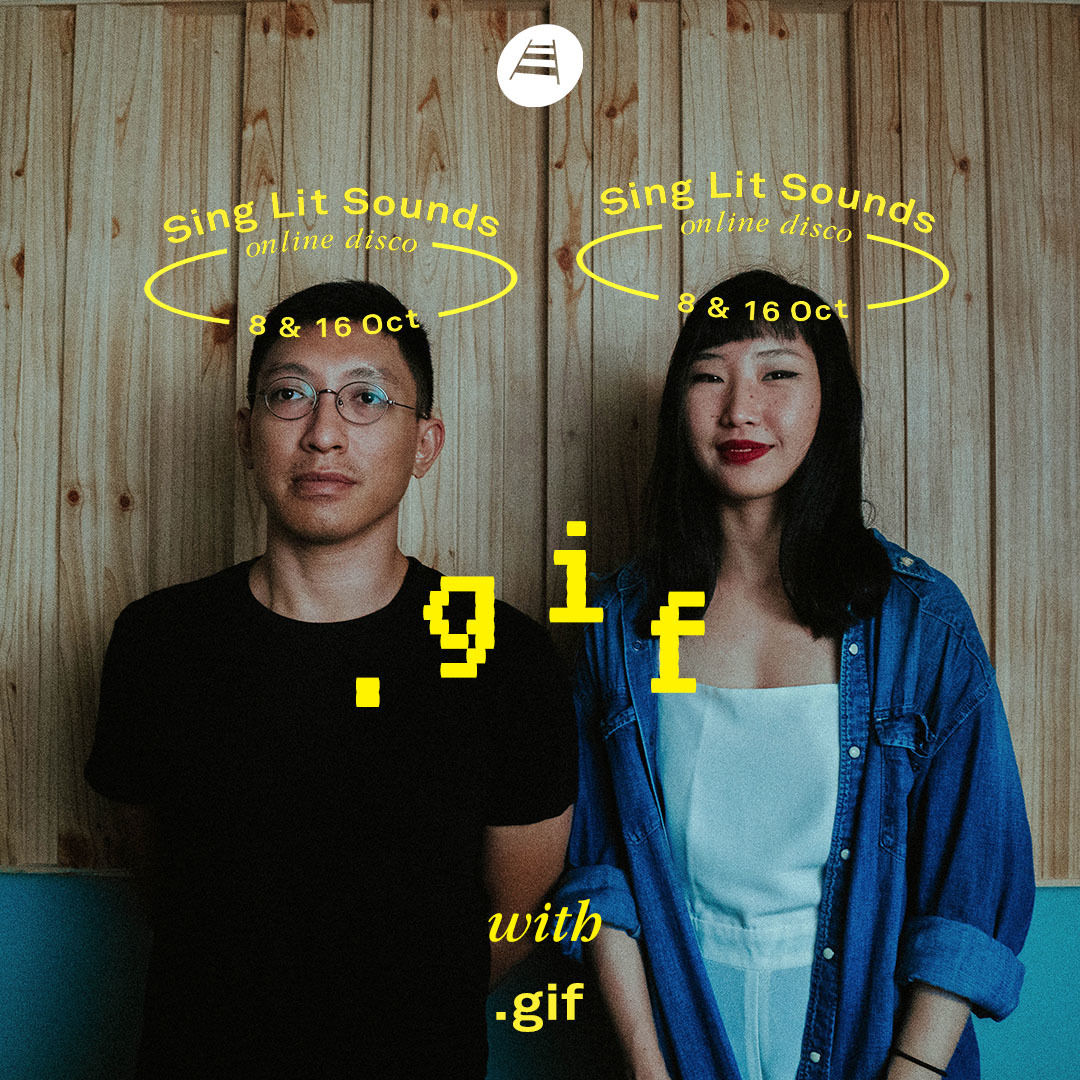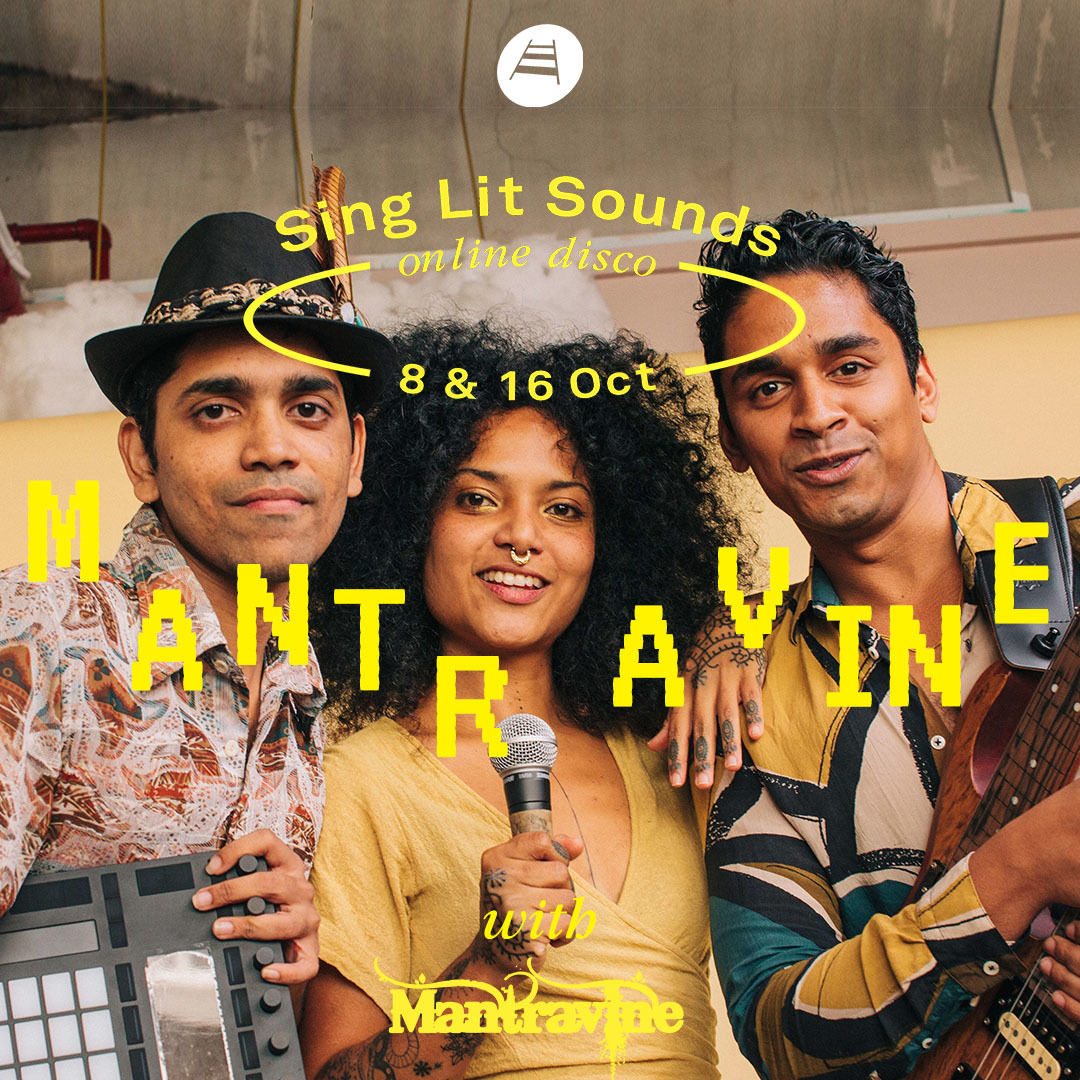It’s not every day that you get to groove to an online disco, let alone a Singaporean literature-themed one.
Performing at the inaugural silent disco, ‘Sing Lit Sounds’, are homegrown artists Fauxe, .gif, and Mantravine. The online event taking place on 8 and 16 October provides a space for literature aficionados to come together and bond over their common love for Singaporean Literature (Sing Lit). With one week left, it's not too late to sign up and you can even boost your party experience by getting the fun packs which include glowsticks and party decor to really get you in the disco mood!
We caught up with the talented homegrown artists to talk about their experiences being a part of this unique gig and some of their favourite Sing Lit authors.
Fauxe

29-year-old Fauxe has been perfecting his craft for the past six years as a prolific music producer who constantly pushes the boundaries of his own musical endeavours by exploring different genres. With the birth of his 2018 album, Ikhlas, Fauxe is no stranger to creating enchanting pieces that blend folk songs, dance-pop hits, vernacular rap, and more. Here’s what the producer has to say about his gig with Sing Lit Sounds.
Language helps to shape a lot of the music we listen to and identify with. What was the experience like translating your music and ideas in your Mother Tongue Language and using the featured SingLit extracts? How did you make sure listeners could still identify with your music, ideas and style?
Personally, a lot of things start to appear more rhythmically than ever to me. I feel like I've always remained honest and real about what I do. Even with the Malay vocal samples used, a lot of it was just straight-up raw no cut edits. I'd slap the sound bite on the track I made and let it do its thing.
What was your biggest challenge working on this project?
To not overthink.
What was your favourite part of this project?
The first time I said I was done. I just took a breather and listened to the whole thing once through.
On a scale of 1 to 10, with 1 being the least inspired and 10 being the most inspired, how excited were you when you had to take Mother Tongue classes in school? Has that changed since then?
I'd say a 3. I spent my days attending the B syllabus class and playing the piano when my friends went for their mother tongue class.
.gif

Pronounced as dot gif, the Singaporean indie-electronic duo is known for their dark beats and haunting vocals that have graced the global stage with their immersive soundscapes. Since their debut in 2013, the pair have been featured in the Sundance Film Festival in Utah and the Golden Melody Awards 金曲奖 in Taiwan. The latest release was their second studio album, HAIL NOTHING, which dropped in April this year. Familiar with drawing inspiration from literature, theatre, and sound for their music, .gif talks about their craft and experiences playing a gig that is closely intertwined with their art.
Language helps to shape a lot of the music we listen to and identify with. What was the experience like translating your music and ideas in your Mother Tongue Language and using the featured SingLit extracts? How did you make sure listeners could still identify with your music, ideas and style?
We didn’t translate any of the excerpts into English; we felt that only a professional translator would have a chance at capturing the poetry and emotion of the writing accurately. So, we fashioned an entire, almost, DJ set: each text and song flows into the next, as sonic elements fade in and out. The compositions retained our signature haunting, trip-hop style, yet morphed to capture--as best as we could--the emotion of each text.
What was your biggest challenge working on this project?
Din: Circuit breaker meant that we had to work remotely, and while we’re usually quite good at that, the language barrier posed very unique challenges. I don’t know Mandarin, and so all the extracts contained no information for me -- no story, no tone, no atmosphere, no emotion, nothing. Relying on Weish’s overall synopsis of each extract wasn’t enough; I needed to know how the music could crest or sigh alongside the text. So I attempted to become hypersensitive to non-textual cues -- breaths, vocal inflexions, dynamics in the reading, and respond instinctively.
What was your favourite part of this project?
Weish: My Chinese is very rusty, so it felt really good to exercise that muscle again! I used to be very fluent back in school, but because I haven’t spoken it at home, at work, or with friends for many years, my confidence in Mandarin has really plummeted. Making sure I read the text with conviction and flow was really tough, but very rewarding--well, I hope I did a decent job!
On a scale of 1 to 10, with 1 being the least inspired and 10 being the most inspired, how excited were you when you had to take Mother Tongue classes in school? Has that changed since then?
I’d say it really fluctuated within the whole range of 1-10, depending on the teacher year to year. A good teacher can make a whole lot of difference, y’all. So can a bad one.
Do you have any favourite SingLit author(s)? Why is he/she a favourite for you?
Cyril Wong. He can contain a universe of emotion in a single flimsy image.
Amanda Lee Koe. Her writing makes me forget to breathe.
Troy Chin. He takes the banal and makes it… more banal, in the most wonderful way.
As for playwrights, just too many to name -- Huzir Sulaiman, Faith Ng, Alfian Sa’at, Joel Tan…
And then there are the poets, and graphic novelists, and… aiyah! Too many!
In five words, how would you describe the party we can expect at Sing Lit Sounds online disco?
A whole damn vibe, friends.
Recommend three songs from Malay, Tamil or Chinese artists from Singapore that you would recommend for readers to listen to as they get ready for this party!
Akeem Jahat - $UA
Preetipls - E8
Fariz Jabba, omarKENOBI - Kalah
Mantravine

When Mantravine teams up with Sing Lit Station for an online disco, you know it's going to be a literature-psychedelic electronic music blast. Composed of electronic pangs and pings, poetry, and healing rhythms, Mantravine takes their cosmic sound to the next level, especially with their most recent album, 432 Hz Kult. The experimental band has even reached audiences all over the world at music festivals such as the local F1 Grand Prix Race, One Music Camp in Japan, and many more. Constantly bending the rules and defying the odds, here's what Mantravine has to say about playing the upcoming gig.
Language helps to shape a lot of the music we listen to and identify with. What was the experience like translating your music and ideas in your Mother Tongue Language and using the featured SingLit extracts? How did you make sure listeners could still identify with your music, ideas and style?
Rupak: Tamil is not my Mother Tongue, so we had some help from the Sing Lit Station team. Shalani from the Sing Lit team helped with the translations, and we worked together to analyse the different themes, and to work through the moods and themes of the songs during the recording. It was a very interesting way to work with somebody else’s texts, and it wasn’t difficult to implement our own musical vision and ideas because we’ve got very specific tools that allow us to maintain our musical identity. Isuru plays the guitar, and he plays a mixture of Karnatic guitar mixed with a fusion of jazz and rock, so he’s got his own style that he brings to the table. I myself work with recordings I’ve taken or samples I’ve created, which are part of my musical collection. Deborah comes in with her voice and her interpretation, so all of our “tools” are quite different and bringing them together gives us the identity of our sound.
What was your biggest challenge working on this project?
Working with the timelines—not because they were difficult to work with or anything, but rather more challenging because our bandmate Deborah was preparing to leave for New Zealand, and so it was more of trying to get the tracks out on time. When you’re leaving a country there’s a lot of things you need to do before you leave, so managing everyone’s schedules was the biggest challenge of this project. Other than that, this was a really fun project that we were able to be creative on, and even the challenge of timelines was manageable because we were all really excited to be a part of the project.
What was your favourite part of this project?
Our favourite part was actually recording the writers because we were able to meet people from different backgrounds than us. One of them was this older gentleman with this fantastic voice, who was just so calm and composed. It felt like he had been doing this (recording music or even voice-overs) for years. Not many takes were needed to get the recording we need, and as with him, it was a pleasure to work with everybody as well.
On a scale of 1 to 10, with 1 being the least inspired and 10 being the most inspired, how excited were you when you had to take Mother Tongue classes in school? Has that changed since then?
I would say it's about a 2 or a 3, I actually took Malay as my second language since my official Mother Tongue wasn’t offered in school. It was a little bit hard for me, so naturally, I wasn’t too excited about it. But that has changed since I’m doing music full-time now, and music is all about language. I have a deep interest in language in general and I think I would have approached learning Mother Tongue in school in a very different way than I had. When I was younger, I think the focus was very much on passing exams, but now I would have actually liked to integrate some fluency in the learning of the language.
Do you have any favourite SingLit author(s)? Why is he/she a favourite for you?
There’s no single favourite author, though we have heard quite a few spoken word poetry pieces from some of the local poets here. It’s really nice to hear everyone’s work actually, and some of our favourites include those from Jennifer Anne Champion, Stephanie Dogfoot, Deborah Emmanuel (who sings for the band), Marc Nair (who is a big favourite) and Charlene Shepherdson. These are the poets whom we have heard live, and we think they’re doing amazing things with their word art.
In five words, how would you describe the party we can expect at Sing Lit Sounds online disco?
Fusion, different, original, thought-provoking and unique.
Recommend three songs from Malay, Tamil or Chinese artists from Singapore that you would recommend for readers to listen to as they get ready for this party!
So we would recommend checking out the artistes who will be playing at Sing Lit Sounds. For .gif, one of my favourite songs from them is Juvenile. I think they have a new album coming out, and I had a sample peek at that and it sounds really good. Fauxe has a really nice album called “Altruisim: The Beginning”, and you could check out the song “To the Moon”, it’s a really cool song. And from Mantravine, you could check out our song, “Mama”.
To find out more information and get tickets to Sing Lit Sounds, click here.



